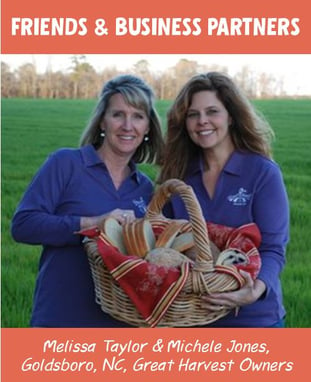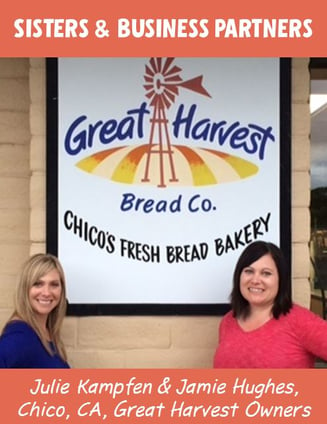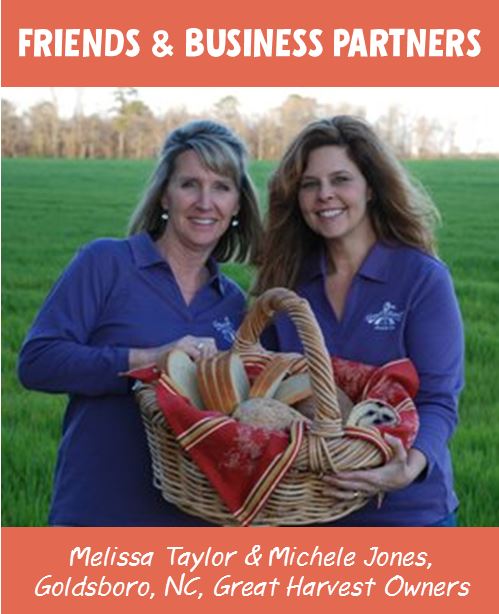 Partnerships are nothing new at Great Harvest. In fact, our franchise is owned by a group of partners. Franchising has been around since the mid-1800s, and the Great Harvest franchise has been around since 1976. In that long history, many successful franchising partnerships have been forged . . . while others have been more dysfunctional.
Partnerships are nothing new at Great Harvest. In fact, our franchise is owned by a group of partners. Franchising has been around since the mid-1800s, and the Great Harvest franchise has been around since 1976. In that long history, many successful franchising partnerships have been forged . . . while others have been more dysfunctional.
Partnerships can provide a stronger foundation for support, financial backing, and overall comfort when entering the small business world. However, there are some things you must consider before moving forward with a partnership.
Before you establish a business partnership:
- Pick the right partner. This is the most important aspect of partnership, as it will largely determine your business success. At Great Harvest, we’ve seen family partnerships, partnerships between friends, co-workers, and at times, even between folks who don’t know each other very well. There are certainly pros and cons to each type of partnership and we cannot determine which is best for your situation. Only you and your potential partner know what will work for your situation.
- Put together a solid plan. Aspects of this plan should include:
- What is the ownership structure? Who will be the majority owner? Is this partnership based upon financial needs or is it based upon operational needs? At Great Harvest, we strongly discourage 50/50 ownership.
- Defining roles and responsibilities – this is critical to a strong partnership. Clearly defining these roles in advance can help mitigate future issues that will arise. How much time is each partner going to put into the business? Consider bakery operations, accounting operations, marketing operations, employee management, etc. Draw on each other’s strengths and experience.
- Think about and discuss with your potential partner how you will handle disagreements and conflicts. What method is going to work? Ensure that your partner and you share the same ideas for handling the inevitable issues that will arise in business ownership.
- Draft a partnership agreement and work on a business plan together. This process will help counter differences of vision and ensure that each partner has a voice in the operation. In order to be awarded a Franchise Agreement, Great Harvest Franchising does have to approve a draft partnership agreement. (Don’t worry – we’ve done the hard part already – we have examples that we provide to candidates). Starting on it earlier, though, will help articulate the vision of the partnership and answer many questions that will come about during the application process.
 Due diligence. Talk to other owners in the system who have partnered. Find out what works for them. Don’t be afraid to ask about the good, bad, and the ugly – of course, be tactful – but it is important to learn about how a partnership can affect the bakery ownership. Each case is different, so it is important to speak with several different owners that have partners. Also, consider talking to small business owners outside of Great Harvest that have also partnered.
Due diligence. Talk to other owners in the system who have partnered. Find out what works for them. Don’t be afraid to ask about the good, bad, and the ugly – of course, be tactful – but it is important to learn about how a partnership can affect the bakery ownership. Each case is different, so it is important to speak with several different owners that have partners. Also, consider talking to small business owners outside of Great Harvest that have also partnered.
- Trust your gut. After you’ve considered a partnership, trust your gut! If it isn’t going to work, it is better to know it now than down the road when the profitability and operations of the bakery are affected. If bakery ownership is a dream of yours but you don’t have the right partner, go back to the drawing board. Re-evaluate the situation and think about others who would be a better fit as your business partner.
Learn more about the Great Harvest Franchise
Other FAQs about business partnerships in franchising:
Q: I’m going to own the bakery with my child. We’re family; do we need a partnership agreement?
A: Yes. Any two (or more) people who are not married and want to own a bakery together are considered a partnership, which requires a partnership agreement.
Q: I really want to own a bakery but I can’t find the right partner. Can I add one later?
A: Yes, you are able to do so. This partner must be approved by the franchise, but it is possible to add a partner at a later date.
Q: Do you need an application from my partner?
A: Yes, if that partner is going to be on the Franchise Agreement.
Q: Does my partner need to attend training?
A: Yes, all parties on the Franchise Agreement are required to do some training, and the primary operator must complete all training.





